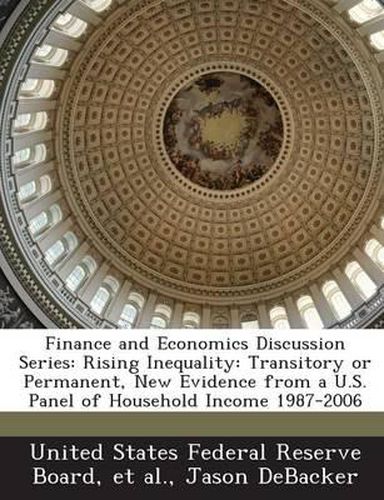Readings Newsletter
Become a Readings Member to make your shopping experience even easier.
Sign in or sign up for free!
You’re not far away from qualifying for FREE standard shipping within Australia
You’ve qualified for FREE standard shipping within Australia
The cart is loading…






We use a new and large panel dataset of household income to shed light on the permanent versus transitory nature of rising inequality in individual male labor earnings and in total household income, both before and after taxes, in the United States over the period 1987-2006. Due to the quality and the significant size of our dataset, we are able to conduct our analysis using rich and precisely estimated error-components models of income dynamics. Our main specification finds evidence for a quadratic heterogeneous income profiles component and a random walk component in permanent earnings, and for a moving-average component in autoregressive transitory earnings. We find that the increase in inequality over our sample period was entirely permanent for male earnings, and predominantly permanent for household income. We also show that the tax system, though reducing inequality, nonetheless did not materially affect its increasing trend. Furthermore, we compare our model-based findings against those of simpler, non-model based inequality decomposition methods. We show that the results for the trends in the evolution of the permanent and transitory variances are remarkably similar across methods, whereas the results for the shares of those variances in cross-sectional inequality differ widely. Further investigation into the sources of these differences suggests that simpler methods produce erroneous decompositions because they cannot flexibly capture the relative degree of persistence of the transitory component of income.
$9.00 standard shipping within Australia
FREE standard shipping within Australia for orders over $100.00
Express & International shipping calculated at checkout
We use a new and large panel dataset of household income to shed light on the permanent versus transitory nature of rising inequality in individual male labor earnings and in total household income, both before and after taxes, in the United States over the period 1987-2006. Due to the quality and the significant size of our dataset, we are able to conduct our analysis using rich and precisely estimated error-components models of income dynamics. Our main specification finds evidence for a quadratic heterogeneous income profiles component and a random walk component in permanent earnings, and for a moving-average component in autoregressive transitory earnings. We find that the increase in inequality over our sample period was entirely permanent for male earnings, and predominantly permanent for household income. We also show that the tax system, though reducing inequality, nonetheless did not materially affect its increasing trend. Furthermore, we compare our model-based findings against those of simpler, non-model based inequality decomposition methods. We show that the results for the trends in the evolution of the permanent and transitory variances are remarkably similar across methods, whereas the results for the shares of those variances in cross-sectional inequality differ widely. Further investigation into the sources of these differences suggests that simpler methods produce erroneous decompositions because they cannot flexibly capture the relative degree of persistence of the transitory component of income.